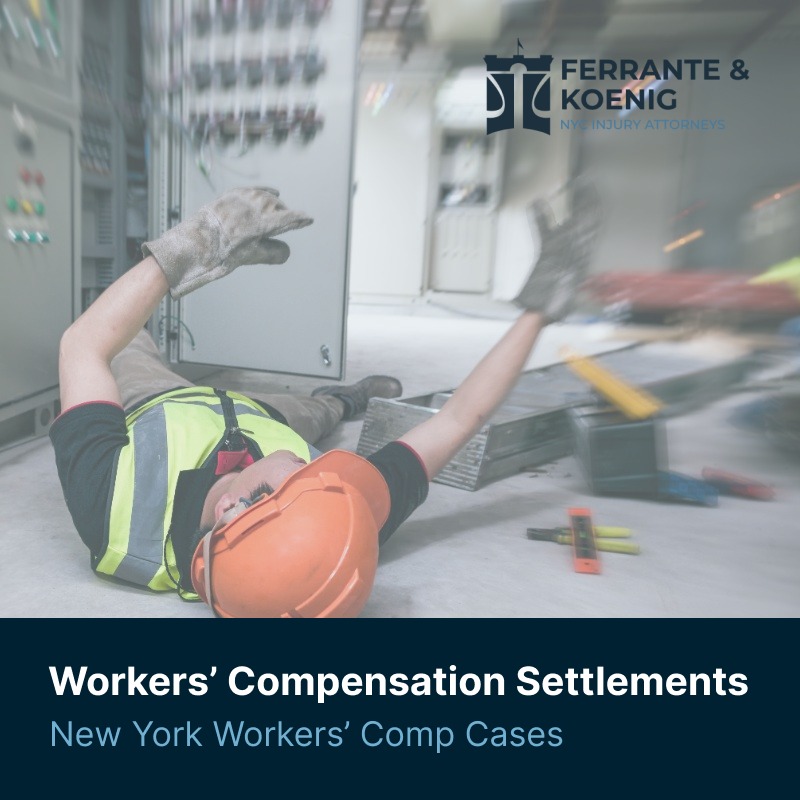There are various types of workers’ compensation ny settlements that can have different effects on your rights after a work injury. Let us help you determine what your case is worth.
No matter how many benefits you receive, keeping your workers’ compensation case open for the long haul can be a pain.
Your employer, the workers’ compensation insurance carrier, and state agencies might engage in seemingly endless monitoring of your healthcare and your actions to determine what you are and are not owed. This is why many workers’ compensation claimants decide to settle their cases.
Settlement can often be the best option in a workers’ compensation claim. However, your settlement should be well-timed, and you must understand the risks in your settlement agreement before you sign it.
A seasoned attorney can handle settlement negotiation and drafting to help ensure the terms of your agreement are beneficial and fair to you. We have been protecting injured workers for more than a decade, and our award-winning advocacy can help you make the most out of our workers’ compensation claim.
Workplace Injury in New York? Reach Out to Ferrante & Koenig 24/7 for Qualified Legal Guidance.
How Are Workers’ Compensation Settlements Calculated in New York?
When it comes to determining the value of workers’ compensation ny settlements, several factors come into play. The process involves assessing various elements such as the severity of the injury, the extent of disability, medical expenses, lost wages, and future earning capacity.
Additionally, the duration of the disability and the impact on the worker’s ability to perform their job are also considered. Evaluating these factors, along with the statutory guidelines provided by the New York Workers’ Compensation Board, helps in calculating fair and appropriate settlements for workers who have suffered injuries on the job.
What Should Be Included in My Workers’ Compensation Settlement?
You can fully or partially settle your workers’ compensation claim. How comprehensive should your settlement be? That depends on your needs, your circumstances, and the details of your case.
In general, a workers’ compensation settlement can include the following benefits:
- Replacement of lost wages when your injury keeps you away from work for more than seven days;
- Compensation for any permanent impairment or disfigurement you suffer from your injury; and
- Payment for healthcare to treat your work-related injury.
Your attorney can arrange for you to receive your settlement compensation in a lump sum or annuity.
Related: 5 Steps to Take After Being Injured at Work in New York
Are All Workers’ Compensation Settlements the Same?
There are multiple types of workers’ compensation settlements that can have different effects on your rights after a work injury. The main types of settlements are stipulation agreements and Section 32 waiver agreements.
What Is the Difference Between an Occupational Disease and an Accident in NY Workers’ Compensation Settlements?
In New York workers’ compensation law, an occupational disease refers to a condition that develops over time due to repeated exposure or conditions inherent to a specific job, such as respiratory illnesses caused by long-term exposure to hazardous chemicals. In contrast, an accident involves a sudden, identifiable event like slipping or being struck by a falling object, leading to an immediate injury. The filing deadlines differ: for occupational diseases, the timeline starts when the worker becomes aware of the job-related cause, while for accidents, it begins on the date of the incident.
These distinctions are important when negotiating workers’ compensation settlements in NY. Occupational diseases must be clearly tied to the nature of the employment, while accidents are typically one-time occurrences. The type of injury influences the benefits a worker is eligible for and the process for filing claims.
What Is a Stipulation Agreement?
Several factors determine what type of workers’ compensation benefits you receive and how substantial they are. Your benefits depend on the following:
- Your level of impairment,
- The location of your injury,
- The type of medical treatment you should receive,
- Your average weekly wage, and
- Your potential to find employment after suffering the injury.
In a stipulation agreement, an injured worker and the workers’ compensation insurer agree on one or all of the factors mentioned above.
An agreement to one of these factors can cut down the amount of time you spend in contentious hearings regarding your treatment needs or entitlement to benefits.
The terms of your stipulation agreement might foreclose some of your rights, so a Workers’ Compensation Law Judge (WCLJ) must approve the agreement before it becomes effective.
What Is a Section 32 Waiver Agreement?
Through a Section 32 waiver agreement, you and the workers’ compensation insurer can determine the amount of indemnity you will receive, the amount of medical care you will receive, or both. In general, whatever you settle in a Section 32 waiver agreement will forever bar your right to seek additional benefits in the future.
Section 32 waiver agreements come with significant consequences. You should consult with an attorney to help ensure that the terms of your settlement are just and the agreement is the best option for your case. And before a Section 32 waiver agreement becomes binding, the Workers’ Compensation Board must approve it.
What Should I Consider Before Settling My Workers’ Compensation Case?
As you can see, entering into any kind of settlement in regard to your right to workers’ compensation benefits is serious business.
If you settle too soon or for too little (which is often what the insurance companies hope for), you could find yourself struggling with a serious injury and little recourse to address the losses the injury has caused.
The first step you should take if you are contemplating a settlement is to speak to an experienced attorney. A good attorney understands how workers’ compensation insurers think and how to convince them to release the most funds in a settlement agreement.
A skilled attorney can also guide you regarding the best timing for settling a claim or whether the better choice is to litigate a claim. When you meet with your attorney about settling your claim, you should keep the following questions in mind.
Related: Do I File A Workers’ Comp Or Personal Injury Claim After Workplace Injury?
Have You Reached Maximum Medical Improvement?
At some point during their case, a workers’ compensation claimant reaches a point where they have healed as much as possible, and further medical intervention is unlikely to improve their condition. This point is called maximum medical improvement (MMI).
Once an injured worker is at MMI, their wage replacement benefits cease, and they receive an impairment rating that determines how much compensation they will receive in disability payments. Additionally, curative medical treatments covered by workers’ compensation end when a claimant reaches MMI.
You should not settle a case until you have reached MMI or are close to reaching MMI. Injuries have a habit of worsening at unexpected times, and if you settle your case before your provider declares you are at MMI, you might find yourself with demanding and expensive medical needs that you did not anticipate.
Ferrante & Koenig can negotiate a settlement that helps you avoid unexpected losses, and he can help you receive the type of medical attention necessary for making the best decisions in your claim.
Did the Workers’ Compensation Insurance Carrier Properly Calculate Your Average Weekly Wage?
The two most significant determinants of the types and amount of benefits you receive are the extent of your injuries and your average weekly wage (AWW). There are many ways to calculate your AWW, and it should be fair.
If you were employed for only a short period of time before you were injured, or your injury came immediately after a pay increase, the insurance company might try to shortchange you by using your old pay rate or a limited amount of paychecks for its calculation.
Sometimes, employers and insurance carriers must take into account what an individual would have earned for an entire year at the job you just started. And if you are under 25, your employer might have to consider your wage expectancy in its AWW calculation.
You are also often entitled to a higher AWW if you were working for multiple employers at the time you suffered harm. An experienced attorney can maximize your AWW in a settlement agreement.
How Employable Are You Since Suffering Your Injury?
The default rule in New York is that an employer can fire you at any time and for any reason. However, an employer cannot fire you for filing a workers’ compensation claim.
While your workers’ compensation claim is open, you can typically enjoy a substantial level of job protection. But the closure of your case through a full settlement makes you once again vulnerable to unexpected termination.
If you are considering full settlement of your workers’ compensation claim, think about your resources and how easy or difficult it will likely be to find subsequent employment. If you feel secure about finding other work or if you are ready to retire, a settlement might be the right choice for you.
Speak to an Experienced Workers’ Compensation Attorney Immediately
The time and effort you spend at work are precious, and you should be well compensated for any injury you suffer while serving your employer.
Ferrante & Koenig have the skills and know-how to hold employers and insurers accountable for every penny they owe you. We are dedicated to winning the best outcomes for injured workers. In fact, we have won millions on behalf of injured employees.
Call our office at 646-450-4110 or contact us online. Our consultations are free.


















